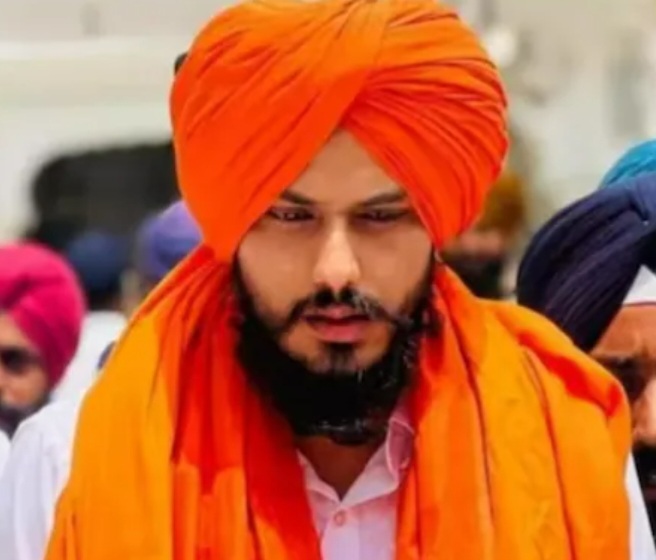By: Vaibhav Borude, Research Analyst, GSDN

On February 24, 2023 a police station was attacked in Ajnala, on the outskirts of Amritsar, Punjab, India and one name flashed in the media all over India: Amritpal Singh, a radical Sikh preacher who used the idea of Khalistan to create a violent atmosphere in Punjab. He and his aides stormed the police station to demand the release of their assistant, Lovepreet Singh. The fact that they used the symbols of Sikh religious leaders distinguishes this attack. Amritpal and his supporters, some of them brandishing swords and guns, barged into the Ajnala police station using the Sikh holy book as a shield. Videos of Amritpal’s close aides carrying weapons with the Anandpur Khalsa Force’ logo have also been found.
The question arises: who is Amritpal Singh? Amritpal Singh first gained traction on social media during the farmer’s stir against the now-repealed farm laws. He was a vocal supporter of protest leader Deep Sidhu, who hit the headlines over the hoisting of the ‘Nishan Sahib flag’ on the Red Fort in New Delhi on Republic Day in 2021. Singh then lived in Dubai, where he had been working as a dispatcher in the family-owned transport business for the past 10 years. His family is from Jallupur Khera in Amritsar.
In February 2022, Sidhu died in a car accident. Amritpal Singh was then selected as the leader of ‘Waris Punjab de’, an organisation that was founded by Deep Sidhu. This dastarbandi (installation) ceremony was held at Rhode, Bhindarwale’s village, amid slogans of “Khalistan Zindabad ”. Amritpal Singh openly says that he draws inspiration from Jarnail Singh Bhindarwale, the militant leader who was killed in 1984. Amritpal Singh’s popularity was built over Facebook Live and other social media sessions with his aggressive speeches against regional and national political parties, feminists, activists, Khalsa Aid, and even some pro-Khalistan groups such as Dal Khalsa.
Amritpal Singh started to tour Punjab to build some support but was not able to capture the popular imagination of the people. After the police station incident, he thought that popular support had started gaining traction. He said that he would launch another procession. To break this momentum, on March 18, 2023, the government started a crackdown against him, and since this date, he has been on the run.
This has led to the start of geo-political tensions in relations between India and some countries that have a previous record of Khalistan activities like Canada, Australia, Germany, UK and USA. The Indian consulate was attacked in London after the search operation for Amritpal Singh A Khalistan protester attacked the staff in the consulate and lowered the Indian tricolour, replacing it with the Khalistan flag.
The attack was prominent as it was carried out in the heart of the UK, i.e., London, which has the highest grade of security. Following the incident, India summoned the senior-most British diplomat in Delhi and demanded an explanation over the complete “absence of security” at the mission. Foreign Secretary Vinay Kwatra also informed that the government has asked UK authorities to quickly attack and prosecute those who are involved in this act.
After the London incident, the diplomatic tensions remained high; later, the Indian side lowered the security outside the UK consulate in India. Also, the sand barracks along the UK consulate were later removed.
After the UK incident, the Indian consulate in San Francisco, USA, was attacked. This protest movement is on the rise, raising the issue of Khalistan and expressing strong support for Amritpal Singh. India registered its “strong protest” with the US Charge d’Affaires in New Delhi over the incident and asked the American government to take appropriate measures to prevent the recurrence of such incidents. Later, US State Department Deputy Spokesperson Vedant Patel condemned the incidents of violence at Indian diplomatic facilities in the United States, saying violence is never an acceptable form of protest.
Similar protest movements in countries such as Canada and Australia have also been reported. This protest movement raises the serious question as to who is behind it? Many analysts and intelligence sources refer to the support of ISI in the Khalistan movement and the present protest movement. The swift entry and rise of Amritpal Singh point towards the role of ISI in finding and pushing the movement into mainstream culture. After the loss of Pakistan in the Kargil War, ISI has started the policy of ‘hundred cuts’ to India. The Khalistan movement is one part of this movement. The main aim of this policy of Pakistan is to balkanize India, as Pakistan knows it cannot win against India in a conventional war.
The rise of Amritpal Singh and the waves of the Khalistan movement pose a challenge for the North American bloc, as many of the affluent immigrants of Punjab support the Khalistan movement, so they use this opportunity and show it as a part of their self-development rights. The geo-political ramifications are high, as it can lead to diplomatic protests that drain precious time and resources to this issue when the world is changing.
The best part of the Amritpal Singh episode shows that it lacks mass support, and the people of Punjab have strongly supported the government, showing that the Khalistan movement is a dream of few miniscule people, who with their deep pockets use media amplification tools to show this as all of Punjab’s popular aspiration. The Indian state, as long as it remains secular and federal, the Khalistan movement would fail to realise its dream.

